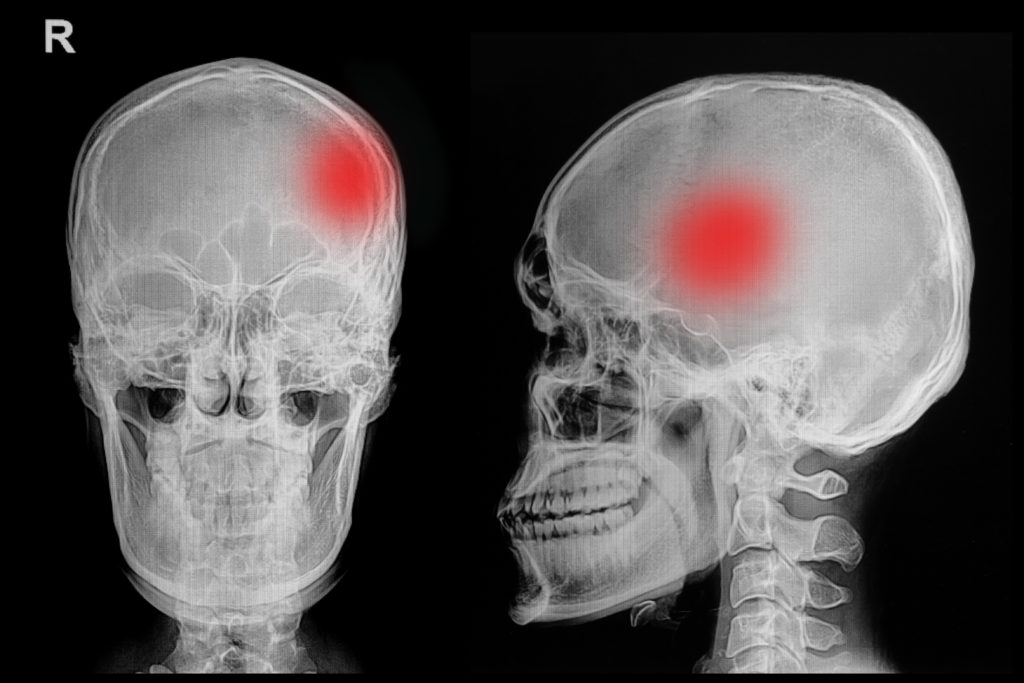
The skull plays a critical role in protecting the brain. If, however, an impact or blow to the head is severe enough, this protective barrier could end up fracturing, or breaking, putting the brain at risk of serious injury. Skull fractures can be extremely dangerous, requiring immediate treatment to avoid permanent damage.
Types of Skull Fractures
There are a lot of different types of skull fractures, each of which comes with its own risks, symptoms, and treatment options. The most common, however, include:
- Simple fractures, which occur when the skull is broken, but there is no damage to the skin;
- Linear or hairline fractures, which resemble a thin line and don’t involve any splintering, distortion, or depression in the bone;
- Depressed fractures, which occur when the skull breaks and actually caves in towards the brain; and
- Compound fractures, which are one of the most serious types of fractures, as they involve a splintering of the bone and puncturing of the skin.
Most skull fractures occur when the head sustains a sudden trauma, like a severe blow or impact. This can happen as a result of a car accident, a fall, or even a physical assault. Besides the pain and difficulty of healing a broken bone, skull fractures are also often accompanied by brain injury, like subdural hematoma, which could require surgical intervention to relieve pressure and stop internal bleeding.
Skull Fracture Symptoms
The symptoms of a skull fracture will depend partly on the type of fracture in question, but many victims experience some or all of the following:
- Bleeding from the wound;
- Swelling or tenderness near the site of impact;
- Facial bruising;
- Drainage of blood or other fluid from the ears or nose;
- Convulsions;
- Loss of consciousness; and
- Severe pain.
The victim of a skull fracture will not, however, always experience these kinds of obvious symptoms. Someone who suffers a simple fracture, for instance, may show no outward signs besides a bump on the head and even this can take up to 24 hours to develop, which is why it is so important for those who sustain head trauma in an accident, to seek medical attention as soon as possible.
Diagnosing a Skull Fracture
When confirming that an accident victim has suffered a skull fracture, a healthcare provider will conduct a variety of tests, including:
- Blood and urine labs;
- EEG, or brain wave tests;
- A computerized tomography (CT) scan, which provides a detailed 3-D image of both the skull and the brain;
- A magnetic resonance imaging (MRI) scan, which provides an image of the bone, as well as surrounding soft tissues; and
- X-rays, which provide an image of the skull itself.
These tests can be prohibitively expensive. Fortunately, accident victims who can prove that someone else’s negligence was the cause of their accident can often recover compensation for these kinds of losses from the at-fault party.
Treating a Skull Fracture
Once diagnosed, a skull fracture victim can start receiving treatment. Treating a skull fracture is, however, different than what is required when a person breaks another type of bone, as putting a cast around and immobilizing a person’s head isn’t really an option. For this reason, rest and time are two of the most important factors in the successful healing of a skull fracture. This, however, is only true if there is no further danger to the brain. If, for instance, a shard of the broken skull actually pierced the brain, then a person will require multiple surgeries to remove the object and ensure correct healing. Similarly, for depressed skull fractures, surgery is required to alleviate pressure on the brain, as the indentation can cause dangerous compression of the brain tissue.
Again, the cost of treating these kinds of serious injuries is often high, making it particularly important for accident victims to consider seeking compensation for their losses from the negligent person who caused their accident.
Contact Dolan Dobrinsky Rosenblum Bluestein Today
Many accident victims struggle not only with coming to terms with their injuries, but also with the financial repercussions of obtaining a diagnosis and treatment. Fortunately, accident victims do not have to shoulder this burden alone, but can seek the assistance of an experienced Miami brain injury lawyer, who can help them seek compensation for their losses from the person who was actually responsible for the accident. For an evaluation of the strengths of your own case, please call Dolan Dobrinsky Rosenblum Bluestein at 305-371-2692 and set up a free consultation today. You can also reach us via online message 24 hours a day.